Complex Traumas and Trauma-Informed Care Principles and Practices
VerifiedAdded on 2023/01/17
|9
|3028
|69
AI Summary
This essay discusses complex traumas and the principles and practices of trauma-informed care. It explores the impact of past trauma on behavior and how mental health nurses can collaborate with patients for effective care planning. The essay also highlights the issues contributing to problematic substance use in a video scenario and provides insights on how mental health nurses can address these issues.
Contribute Materials
Your contribution can guide someone’s learning journey. Share your
documents today.

UNIT:
NAME:
DATE:
NAME:
DATE:
Secure Best Marks with AI Grader
Need help grading? Try our AI Grader for instant feedback on your assignments.
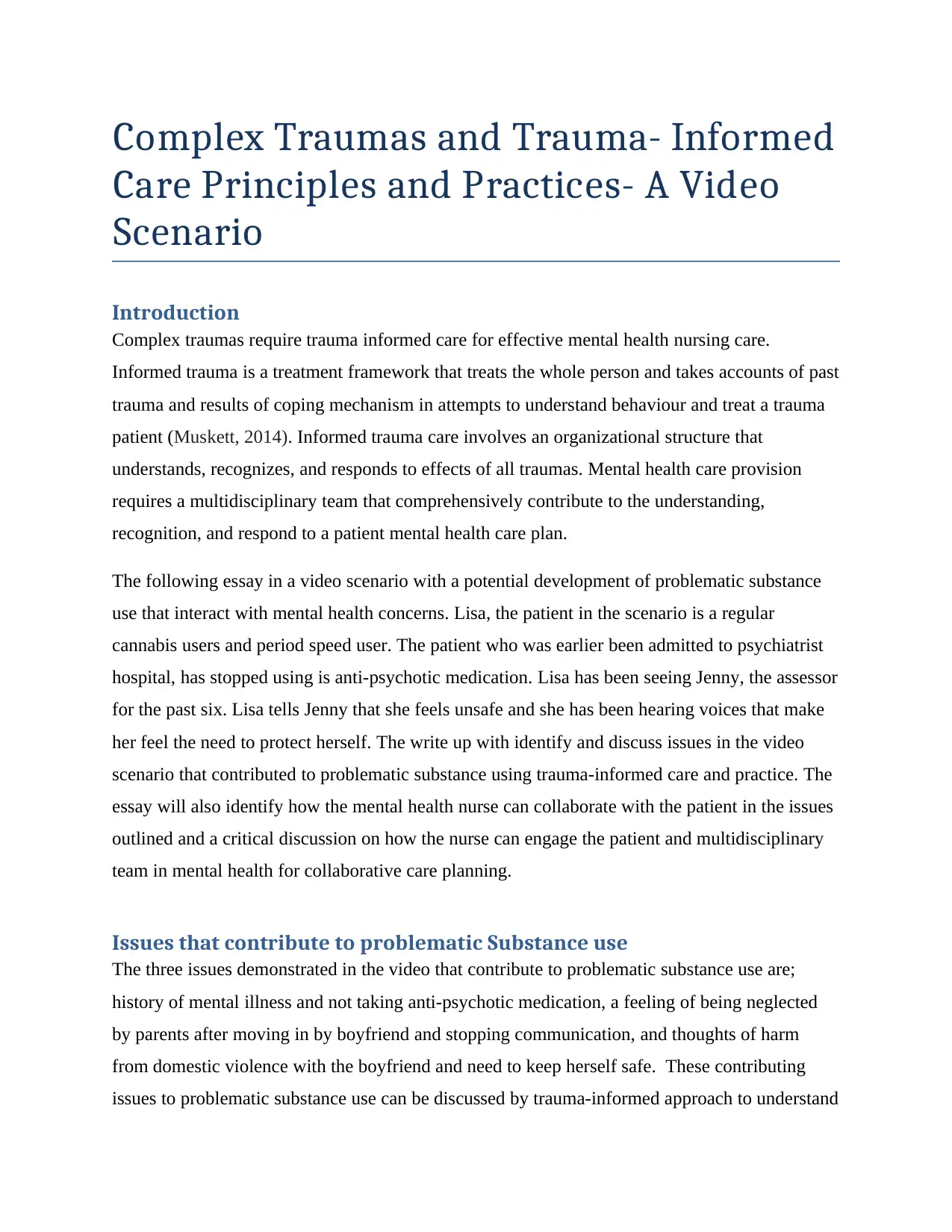
Complex Traumas and Trauma- Informed
Care Principles and Practices- A Video
Scenario
Introduction
Complex traumas require trauma informed care for effective mental health nursing care.
Informed trauma is a treatment framework that treats the whole person and takes accounts of past
trauma and results of coping mechanism in attempts to understand behaviour and treat a trauma
patient (Muskett, 2014). Informed trauma care involves an organizational structure that
understands, recognizes, and responds to effects of all traumas. Mental health care provision
requires a multidisciplinary team that comprehensively contribute to the understanding,
recognition, and respond to a patient mental health care plan.
The following essay in a video scenario with a potential development of problematic substance
use that interact with mental health concerns. Lisa, the patient in the scenario is a regular
cannabis users and period speed user. The patient who was earlier been admitted to psychiatrist
hospital, has stopped using is anti-psychotic medication. Lisa has been seeing Jenny, the assessor
for the past six. Lisa tells Jenny that she feels unsafe and she has been hearing voices that make
her feel the need to protect herself. The write up with identify and discuss issues in the video
scenario that contributed to problematic substance using trauma-informed care and practice. The
essay will also identify how the mental health nurse can collaborate with the patient in the issues
outlined and a critical discussion on how the nurse can engage the patient and multidisciplinary
team in mental health for collaborative care planning.
Issues that contribute to problematic Substance use
The three issues demonstrated in the video that contribute to problematic substance use are;
history of mental illness and not taking anti-psychotic medication, a feeling of being neglected
by parents after moving in by boyfriend and stopping communication, and thoughts of harm
from domestic violence with the boyfriend and need to keep herself safe. These contributing
issues to problematic substance use can be discussed by trauma-informed approach to understand
Care Principles and Practices- A Video
Scenario
Introduction
Complex traumas require trauma informed care for effective mental health nursing care.
Informed trauma is a treatment framework that treats the whole person and takes accounts of past
trauma and results of coping mechanism in attempts to understand behaviour and treat a trauma
patient (Muskett, 2014). Informed trauma care involves an organizational structure that
understands, recognizes, and responds to effects of all traumas. Mental health care provision
requires a multidisciplinary team that comprehensively contribute to the understanding,
recognition, and respond to a patient mental health care plan.
The following essay in a video scenario with a potential development of problematic substance
use that interact with mental health concerns. Lisa, the patient in the scenario is a regular
cannabis users and period speed user. The patient who was earlier been admitted to psychiatrist
hospital, has stopped using is anti-psychotic medication. Lisa has been seeing Jenny, the assessor
for the past six. Lisa tells Jenny that she feels unsafe and she has been hearing voices that make
her feel the need to protect herself. The write up with identify and discuss issues in the video
scenario that contributed to problematic substance using trauma-informed care and practice. The
essay will also identify how the mental health nurse can collaborate with the patient in the issues
outlined and a critical discussion on how the nurse can engage the patient and multidisciplinary
team in mental health for collaborative care planning.
Issues that contribute to problematic Substance use
The three issues demonstrated in the video that contribute to problematic substance use are;
history of mental illness and not taking anti-psychotic medication, a feeling of being neglected
by parents after moving in by boyfriend and stopping communication, and thoughts of harm
from domestic violence with the boyfriend and need to keep herself safe. These contributing
issues to problematic substance use can be discussed by trauma-informed approach to understand
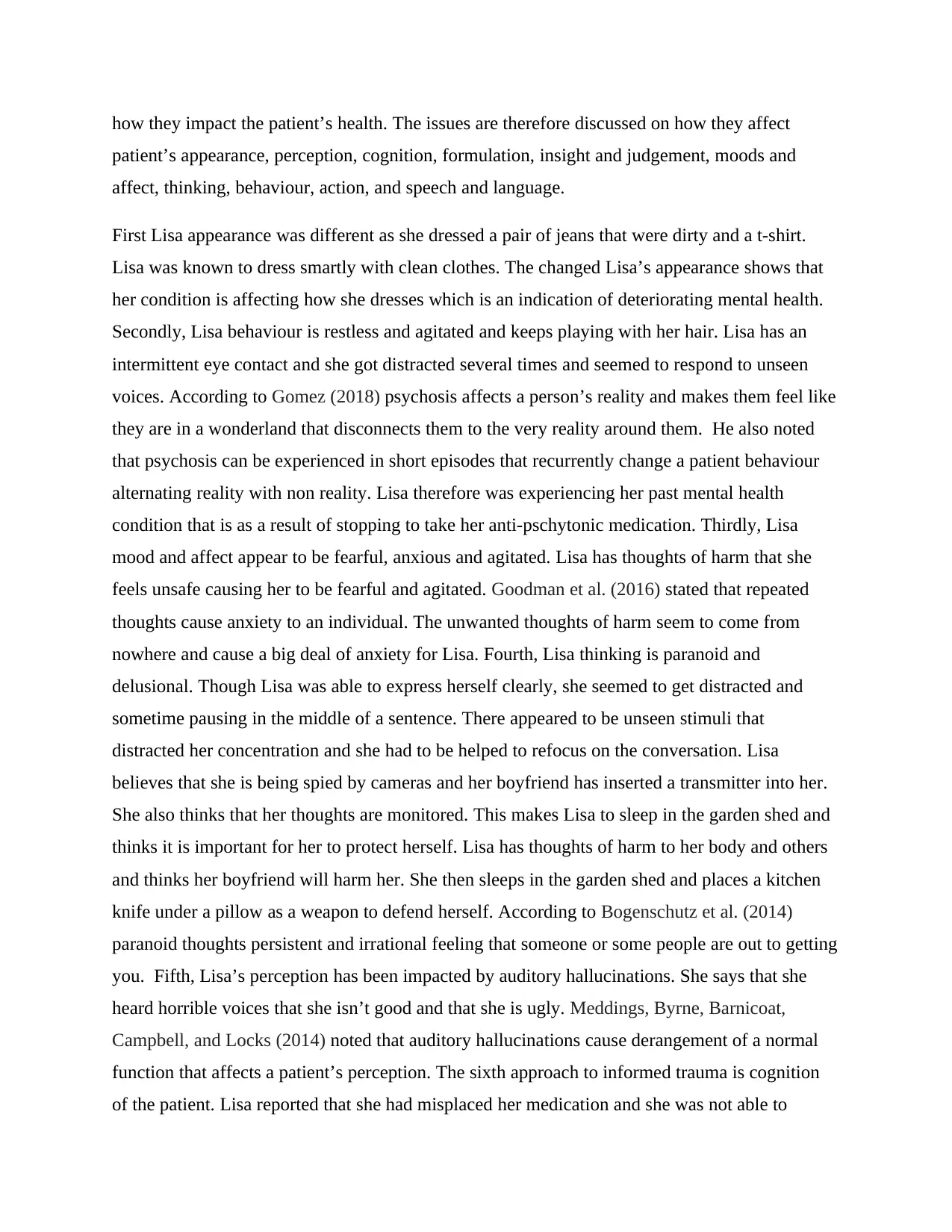
how they impact the patient’s health. The issues are therefore discussed on how they affect
patient’s appearance, perception, cognition, formulation, insight and judgement, moods and
affect, thinking, behaviour, action, and speech and language.
First Lisa appearance was different as she dressed a pair of jeans that were dirty and a t-shirt.
Lisa was known to dress smartly with clean clothes. The changed Lisa’s appearance shows that
her condition is affecting how she dresses which is an indication of deteriorating mental health.
Secondly, Lisa behaviour is restless and agitated and keeps playing with her hair. Lisa has an
intermittent eye contact and she got distracted several times and seemed to respond to unseen
voices. According to Gomez (2018) psychosis affects a person’s reality and makes them feel like
they are in a wonderland that disconnects them to the very reality around them. He also noted
that psychosis can be experienced in short episodes that recurrently change a patient behaviour
alternating reality with non reality. Lisa therefore was experiencing her past mental health
condition that is as a result of stopping to take her anti-pschytonic medication. Thirdly, Lisa
mood and affect appear to be fearful, anxious and agitated. Lisa has thoughts of harm that she
feels unsafe causing her to be fearful and agitated. Goodman et al. (2016) stated that repeated
thoughts cause anxiety to an individual. The unwanted thoughts of harm seem to come from
nowhere and cause a big deal of anxiety for Lisa. Fourth, Lisa thinking is paranoid and
delusional. Though Lisa was able to express herself clearly, she seemed to get distracted and
sometime pausing in the middle of a sentence. There appeared to be unseen stimuli that
distracted her concentration and she had to be helped to refocus on the conversation. Lisa
believes that she is being spied by cameras and her boyfriend has inserted a transmitter into her.
She also thinks that her thoughts are monitored. This makes Lisa to sleep in the garden shed and
thinks it is important for her to protect herself. Lisa has thoughts of harm to her body and others
and thinks her boyfriend will harm her. She then sleeps in the garden shed and places a kitchen
knife under a pillow as a weapon to defend herself. According to Bogenschutz et al. (2014)
paranoid thoughts persistent and irrational feeling that someone or some people are out to getting
you. Fifth, Lisa’s perception has been impacted by auditory hallucinations. She says that she
heard horrible voices that she isn’t good and that she is ugly. Meddings, Byrne, Barnicoat,
Campbell, and Locks (2014) noted that auditory hallucinations cause derangement of a normal
function that affects a patient’s perception. The sixth approach to informed trauma is cognition
of the patient. Lisa reported that she had misplaced her medication and she was not able to
patient’s appearance, perception, cognition, formulation, insight and judgement, moods and
affect, thinking, behaviour, action, and speech and language.
First Lisa appearance was different as she dressed a pair of jeans that were dirty and a t-shirt.
Lisa was known to dress smartly with clean clothes. The changed Lisa’s appearance shows that
her condition is affecting how she dresses which is an indication of deteriorating mental health.
Secondly, Lisa behaviour is restless and agitated and keeps playing with her hair. Lisa has an
intermittent eye contact and she got distracted several times and seemed to respond to unseen
voices. According to Gomez (2018) psychosis affects a person’s reality and makes them feel like
they are in a wonderland that disconnects them to the very reality around them. He also noted
that psychosis can be experienced in short episodes that recurrently change a patient behaviour
alternating reality with non reality. Lisa therefore was experiencing her past mental health
condition that is as a result of stopping to take her anti-pschytonic medication. Thirdly, Lisa
mood and affect appear to be fearful, anxious and agitated. Lisa has thoughts of harm that she
feels unsafe causing her to be fearful and agitated. Goodman et al. (2016) stated that repeated
thoughts cause anxiety to an individual. The unwanted thoughts of harm seem to come from
nowhere and cause a big deal of anxiety for Lisa. Fourth, Lisa thinking is paranoid and
delusional. Though Lisa was able to express herself clearly, she seemed to get distracted and
sometime pausing in the middle of a sentence. There appeared to be unseen stimuli that
distracted her concentration and she had to be helped to refocus on the conversation. Lisa
believes that she is being spied by cameras and her boyfriend has inserted a transmitter into her.
She also thinks that her thoughts are monitored. This makes Lisa to sleep in the garden shed and
thinks it is important for her to protect herself. Lisa has thoughts of harm to her body and others
and thinks her boyfriend will harm her. She then sleeps in the garden shed and places a kitchen
knife under a pillow as a weapon to defend herself. According to Bogenschutz et al. (2014)
paranoid thoughts persistent and irrational feeling that someone or some people are out to getting
you. Fifth, Lisa’s perception has been impacted by auditory hallucinations. She says that she
heard horrible voices that she isn’t good and that she is ugly. Meddings, Byrne, Barnicoat,
Campbell, and Locks (2014) noted that auditory hallucinations cause derangement of a normal
function that affects a patient’s perception. The sixth approach to informed trauma is cognition
of the patient. Lisa reported that she had misplaced her medication and she was not able to
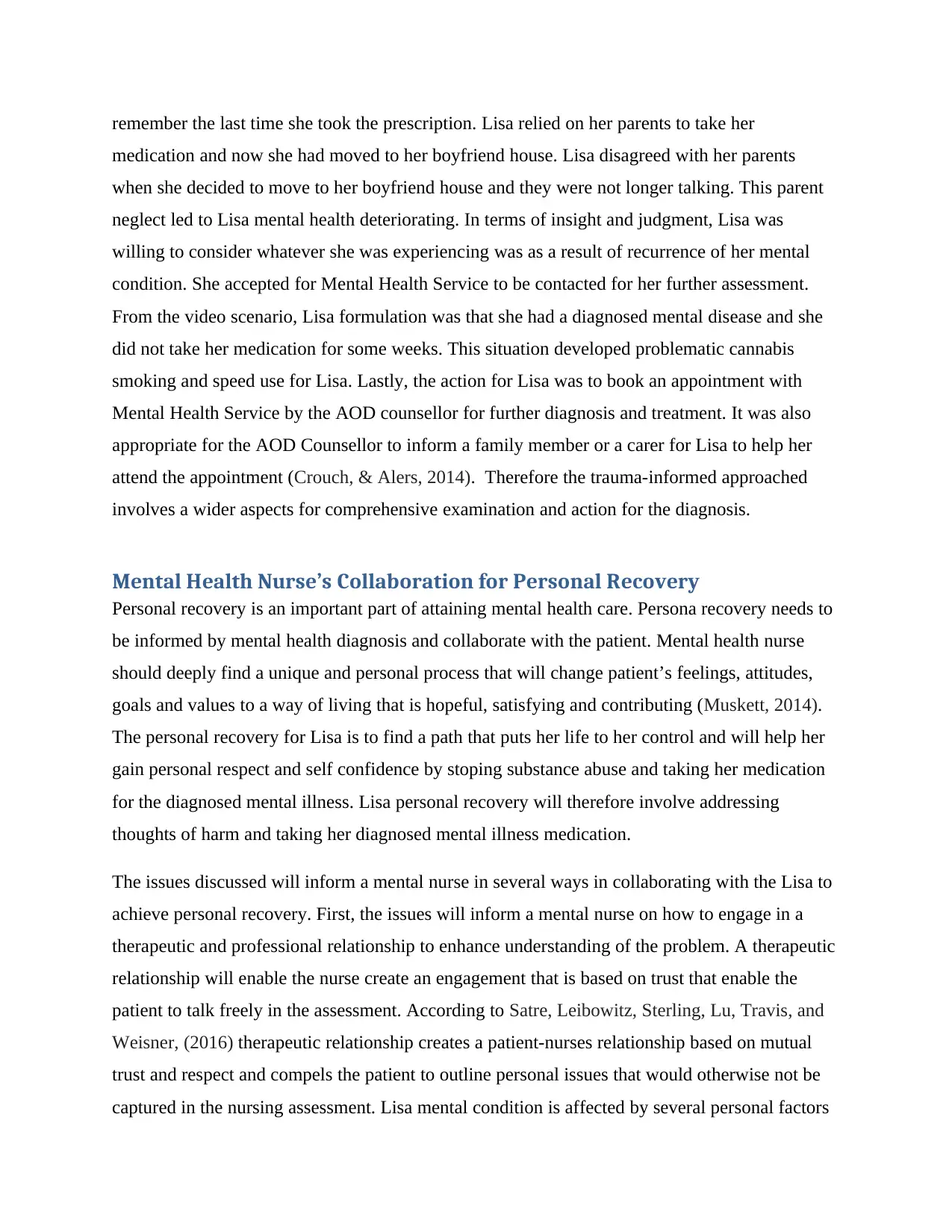
remember the last time she took the prescription. Lisa relied on her parents to take her
medication and now she had moved to her boyfriend house. Lisa disagreed with her parents
when she decided to move to her boyfriend house and they were not longer talking. This parent
neglect led to Lisa mental health deteriorating. In terms of insight and judgment, Lisa was
willing to consider whatever she was experiencing was as a result of recurrence of her mental
condition. She accepted for Mental Health Service to be contacted for her further assessment.
From the video scenario, Lisa formulation was that she had a diagnosed mental disease and she
did not take her medication for some weeks. This situation developed problematic cannabis
smoking and speed use for Lisa. Lastly, the action for Lisa was to book an appointment with
Mental Health Service by the AOD counsellor for further diagnosis and treatment. It was also
appropriate for the AOD Counsellor to inform a family member or a carer for Lisa to help her
attend the appointment (Crouch, & Alers, 2014). Therefore the trauma-informed approached
involves a wider aspects for comprehensive examination and action for the diagnosis.
Mental Health Nurse’s Collaboration for Personal Recovery
Personal recovery is an important part of attaining mental health care. Persona recovery needs to
be informed by mental health diagnosis and collaborate with the patient. Mental health nurse
should deeply find a unique and personal process that will change patient’s feelings, attitudes,
goals and values to a way of living that is hopeful, satisfying and contributing (Muskett, 2014).
The personal recovery for Lisa is to find a path that puts her life to her control and will help her
gain personal respect and self confidence by stoping substance abuse and taking her medication
for the diagnosed mental illness. Lisa personal recovery will therefore involve addressing
thoughts of harm and taking her diagnosed mental illness medication.
The issues discussed will inform a mental nurse in several ways in collaborating with the Lisa to
achieve personal recovery. First, the issues will inform a mental nurse on how to engage in a
therapeutic and professional relationship to enhance understanding of the problem. A therapeutic
relationship will enable the nurse create an engagement that is based on trust that enable the
patient to talk freely in the assessment. According to Satre, Leibowitz, Sterling, Lu, Travis, and
Weisner, (2016) therapeutic relationship creates a patient-nurses relationship based on mutual
trust and respect and compels the patient to outline personal issues that would otherwise not be
captured in the nursing assessment. Lisa mental condition is affected by several personal factors
medication and now she had moved to her boyfriend house. Lisa disagreed with her parents
when she decided to move to her boyfriend house and they were not longer talking. This parent
neglect led to Lisa mental health deteriorating. In terms of insight and judgment, Lisa was
willing to consider whatever she was experiencing was as a result of recurrence of her mental
condition. She accepted for Mental Health Service to be contacted for her further assessment.
From the video scenario, Lisa formulation was that she had a diagnosed mental disease and she
did not take her medication for some weeks. This situation developed problematic cannabis
smoking and speed use for Lisa. Lastly, the action for Lisa was to book an appointment with
Mental Health Service by the AOD counsellor for further diagnosis and treatment. It was also
appropriate for the AOD Counsellor to inform a family member or a carer for Lisa to help her
attend the appointment (Crouch, & Alers, 2014). Therefore the trauma-informed approached
involves a wider aspects for comprehensive examination and action for the diagnosis.
Mental Health Nurse’s Collaboration for Personal Recovery
Personal recovery is an important part of attaining mental health care. Persona recovery needs to
be informed by mental health diagnosis and collaborate with the patient. Mental health nurse
should deeply find a unique and personal process that will change patient’s feelings, attitudes,
goals and values to a way of living that is hopeful, satisfying and contributing (Muskett, 2014).
The personal recovery for Lisa is to find a path that puts her life to her control and will help her
gain personal respect and self confidence by stoping substance abuse and taking her medication
for the diagnosed mental illness. Lisa personal recovery will therefore involve addressing
thoughts of harm and taking her diagnosed mental illness medication.
The issues discussed will inform a mental nurse in several ways in collaborating with the Lisa to
achieve personal recovery. First, the issues will inform a mental nurse on how to engage in a
therapeutic and professional relationship to enhance understanding of the problem. A therapeutic
relationship will enable the nurse create an engagement that is based on trust that enable the
patient to talk freely in the assessment. According to Satre, Leibowitz, Sterling, Lu, Travis, and
Weisner, (2016) therapeutic relationship creates a patient-nurses relationship based on mutual
trust and respect and compels the patient to outline personal issues that would otherwise not be
captured in the nursing assessment. Lisa mental condition is affected by several personal factors
Secure Best Marks with AI Grader
Need help grading? Try our AI Grader for instant feedback on your assignments.
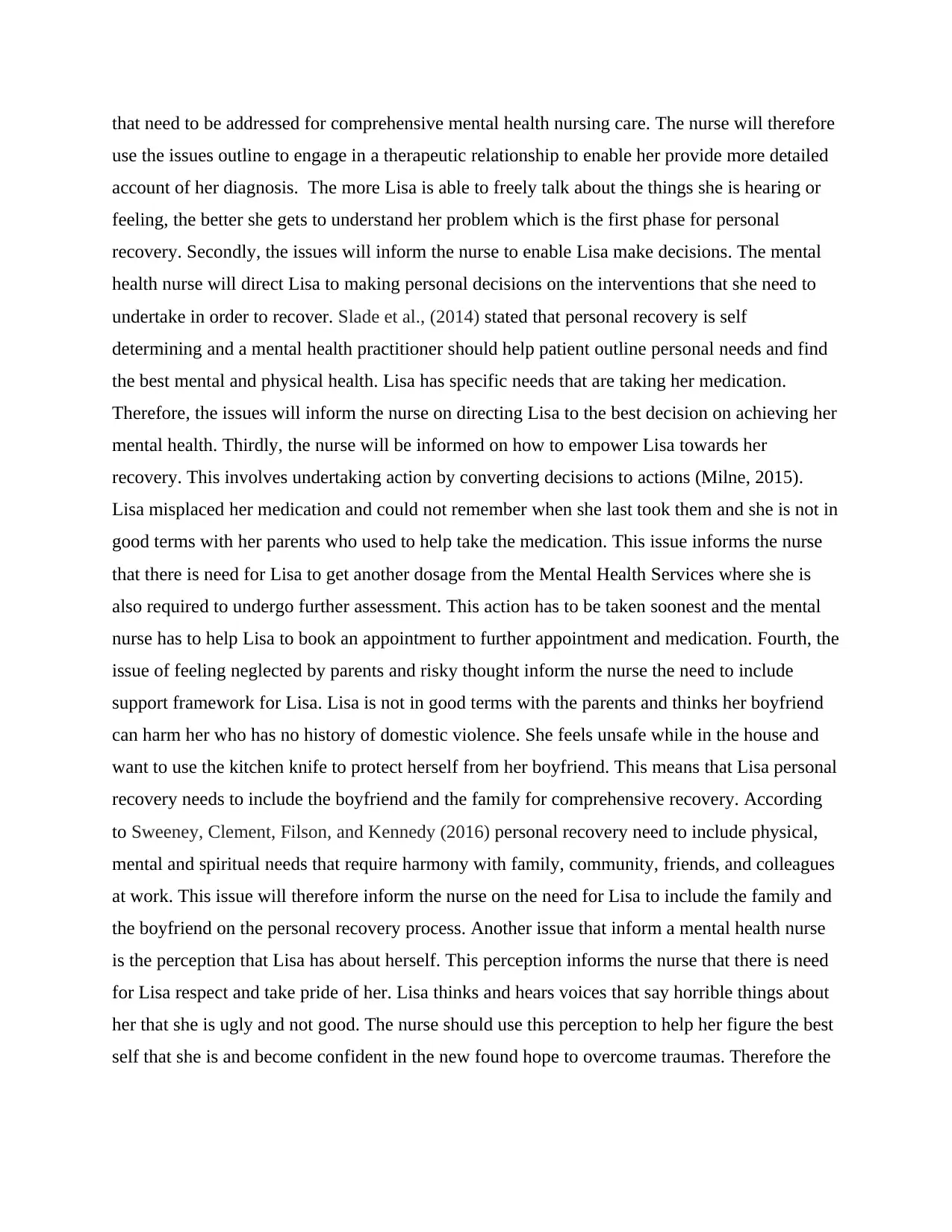
that need to be addressed for comprehensive mental health nursing care. The nurse will therefore
use the issues outline to engage in a therapeutic relationship to enable her provide more detailed
account of her diagnosis. The more Lisa is able to freely talk about the things she is hearing or
feeling, the better she gets to understand her problem which is the first phase for personal
recovery. Secondly, the issues will inform the nurse to enable Lisa make decisions. The mental
health nurse will direct Lisa to making personal decisions on the interventions that she need to
undertake in order to recover. Slade et al., (2014) stated that personal recovery is self
determining and a mental health practitioner should help patient outline personal needs and find
the best mental and physical health. Lisa has specific needs that are taking her medication.
Therefore, the issues will inform the nurse on directing Lisa to the best decision on achieving her
mental health. Thirdly, the nurse will be informed on how to empower Lisa towards her
recovery. This involves undertaking action by converting decisions to actions (Milne, 2015).
Lisa misplaced her medication and could not remember when she last took them and she is not in
good terms with her parents who used to help take the medication. This issue informs the nurse
that there is need for Lisa to get another dosage from the Mental Health Services where she is
also required to undergo further assessment. This action has to be taken soonest and the mental
nurse has to help Lisa to book an appointment to further appointment and medication. Fourth, the
issue of feeling neglected by parents and risky thought inform the nurse the need to include
support framework for Lisa. Lisa is not in good terms with the parents and thinks her boyfriend
can harm her who has no history of domestic violence. She feels unsafe while in the house and
want to use the kitchen knife to protect herself from her boyfriend. This means that Lisa personal
recovery needs to include the boyfriend and the family for comprehensive recovery. According
to Sweeney, Clement, Filson, and Kennedy (2016) personal recovery need to include physical,
mental and spiritual needs that require harmony with family, community, friends, and colleagues
at work. This issue will therefore inform the nurse on the need for Lisa to include the family and
the boyfriend on the personal recovery process. Another issue that inform a mental health nurse
is the perception that Lisa has about herself. This perception informs the nurse that there is need
for Lisa respect and take pride of her. Lisa thinks and hears voices that say horrible things about
her that she is ugly and not good. The nurse should use this perception to help her figure the best
self that she is and become confident in the new found hope to overcome traumas. Therefore the
use the issues outline to engage in a therapeutic relationship to enable her provide more detailed
account of her diagnosis. The more Lisa is able to freely talk about the things she is hearing or
feeling, the better she gets to understand her problem which is the first phase for personal
recovery. Secondly, the issues will inform the nurse to enable Lisa make decisions. The mental
health nurse will direct Lisa to making personal decisions on the interventions that she need to
undertake in order to recover. Slade et al., (2014) stated that personal recovery is self
determining and a mental health practitioner should help patient outline personal needs and find
the best mental and physical health. Lisa has specific needs that are taking her medication.
Therefore, the issues will inform the nurse on directing Lisa to the best decision on achieving her
mental health. Thirdly, the nurse will be informed on how to empower Lisa towards her
recovery. This involves undertaking action by converting decisions to actions (Milne, 2015).
Lisa misplaced her medication and could not remember when she last took them and she is not in
good terms with her parents who used to help take the medication. This issue informs the nurse
that there is need for Lisa to get another dosage from the Mental Health Services where she is
also required to undergo further assessment. This action has to be taken soonest and the mental
nurse has to help Lisa to book an appointment to further appointment and medication. Fourth, the
issue of feeling neglected by parents and risky thought inform the nurse the need to include
support framework for Lisa. Lisa is not in good terms with the parents and thinks her boyfriend
can harm her who has no history of domestic violence. She feels unsafe while in the house and
want to use the kitchen knife to protect herself from her boyfriend. This means that Lisa personal
recovery needs to include the boyfriend and the family for comprehensive recovery. According
to Sweeney, Clement, Filson, and Kennedy (2016) personal recovery need to include physical,
mental and spiritual needs that require harmony with family, community, friends, and colleagues
at work. This issue will therefore inform the nurse on the need for Lisa to include the family and
the boyfriend on the personal recovery process. Another issue that inform a mental health nurse
is the perception that Lisa has about herself. This perception informs the nurse that there is need
for Lisa respect and take pride of her. Lisa thinks and hears voices that say horrible things about
her that she is ugly and not good. The nurse should use this perception to help her figure the best
self that she is and become confident in the new found hope to overcome traumas. Therefore the
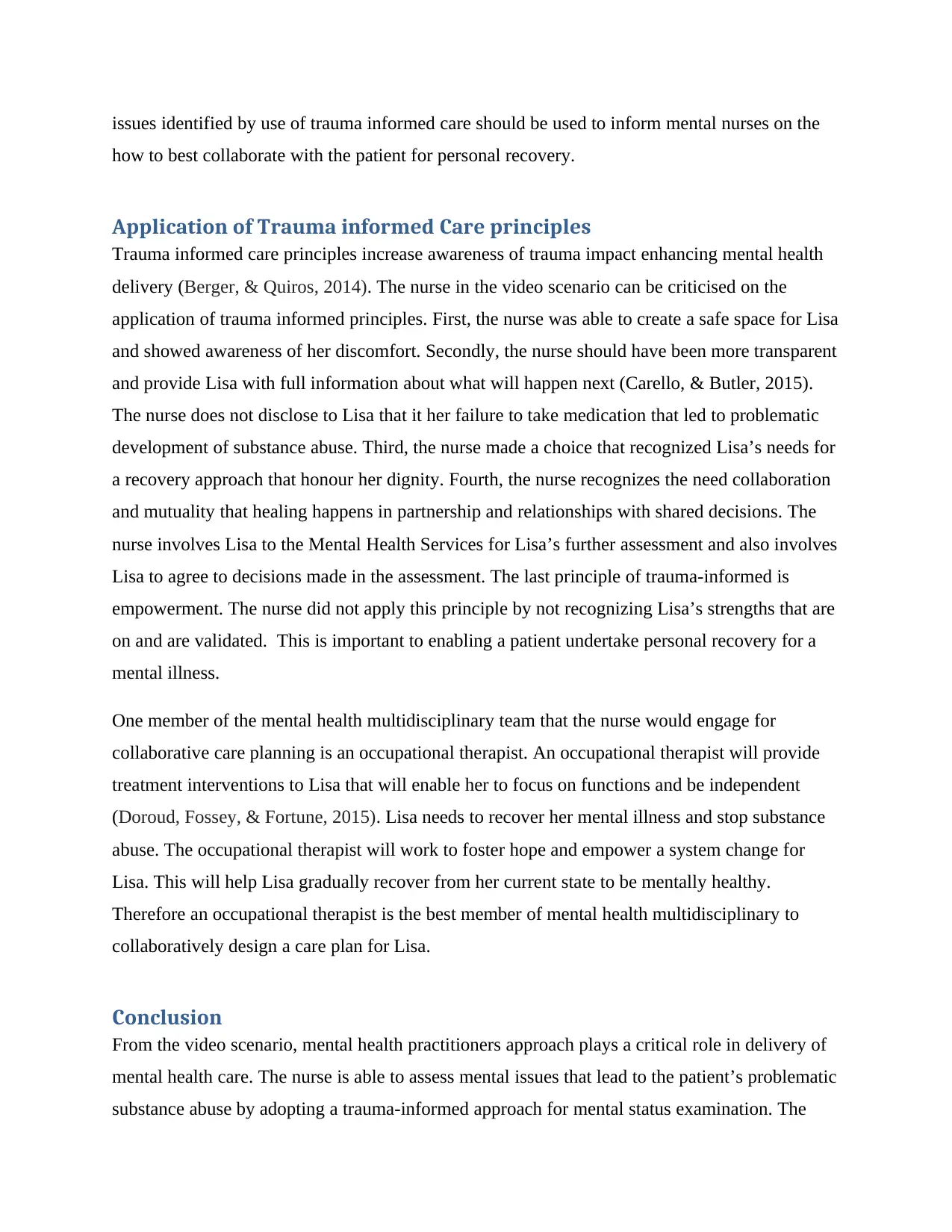
issues identified by use of trauma informed care should be used to inform mental nurses on the
how to best collaborate with the patient for personal recovery.
Application of Trauma informed Care principles
Trauma informed care principles increase awareness of trauma impact enhancing mental health
delivery (Berger, & Quiros, 2014). The nurse in the video scenario can be criticised on the
application of trauma informed principles. First, the nurse was able to create a safe space for Lisa
and showed awareness of her discomfort. Secondly, the nurse should have been more transparent
and provide Lisa with full information about what will happen next (Carello, & Butler, 2015).
The nurse does not disclose to Lisa that it her failure to take medication that led to problematic
development of substance abuse. Third, the nurse made a choice that recognized Lisa’s needs for
a recovery approach that honour her dignity. Fourth, the nurse recognizes the need collaboration
and mutuality that healing happens in partnership and relationships with shared decisions. The
nurse involves Lisa to the Mental Health Services for Lisa’s further assessment and also involves
Lisa to agree to decisions made in the assessment. The last principle of trauma-informed is
empowerment. The nurse did not apply this principle by not recognizing Lisa’s strengths that are
on and are validated. This is important to enabling a patient undertake personal recovery for a
mental illness.
One member of the mental health multidisciplinary team that the nurse would engage for
collaborative care planning is an occupational therapist. An occupational therapist will provide
treatment interventions to Lisa that will enable her to focus on functions and be independent
(Doroud, Fossey, & Fortune, 2015). Lisa needs to recover her mental illness and stop substance
abuse. The occupational therapist will work to foster hope and empower a system change for
Lisa. This will help Lisa gradually recover from her current state to be mentally healthy.
Therefore an occupational therapist is the best member of mental health multidisciplinary to
collaboratively design a care plan for Lisa.
Conclusion
From the video scenario, mental health practitioners approach plays a critical role in delivery of
mental health care. The nurse is able to assess mental issues that lead to the patient’s problematic
substance abuse by adopting a trauma-informed approach for mental status examination. The
how to best collaborate with the patient for personal recovery.
Application of Trauma informed Care principles
Trauma informed care principles increase awareness of trauma impact enhancing mental health
delivery (Berger, & Quiros, 2014). The nurse in the video scenario can be criticised on the
application of trauma informed principles. First, the nurse was able to create a safe space for Lisa
and showed awareness of her discomfort. Secondly, the nurse should have been more transparent
and provide Lisa with full information about what will happen next (Carello, & Butler, 2015).
The nurse does not disclose to Lisa that it her failure to take medication that led to problematic
development of substance abuse. Third, the nurse made a choice that recognized Lisa’s needs for
a recovery approach that honour her dignity. Fourth, the nurse recognizes the need collaboration
and mutuality that healing happens in partnership and relationships with shared decisions. The
nurse involves Lisa to the Mental Health Services for Lisa’s further assessment and also involves
Lisa to agree to decisions made in the assessment. The last principle of trauma-informed is
empowerment. The nurse did not apply this principle by not recognizing Lisa’s strengths that are
on and are validated. This is important to enabling a patient undertake personal recovery for a
mental illness.
One member of the mental health multidisciplinary team that the nurse would engage for
collaborative care planning is an occupational therapist. An occupational therapist will provide
treatment interventions to Lisa that will enable her to focus on functions and be independent
(Doroud, Fossey, & Fortune, 2015). Lisa needs to recover her mental illness and stop substance
abuse. The occupational therapist will work to foster hope and empower a system change for
Lisa. This will help Lisa gradually recover from her current state to be mentally healthy.
Therefore an occupational therapist is the best member of mental health multidisciplinary to
collaboratively design a care plan for Lisa.
Conclusion
From the video scenario, mental health practitioners approach plays a critical role in delivery of
mental health care. The nurse is able to assess mental issues that lead to the patient’s problematic
substance abuse by adopting a trauma-informed approach for mental status examination. The
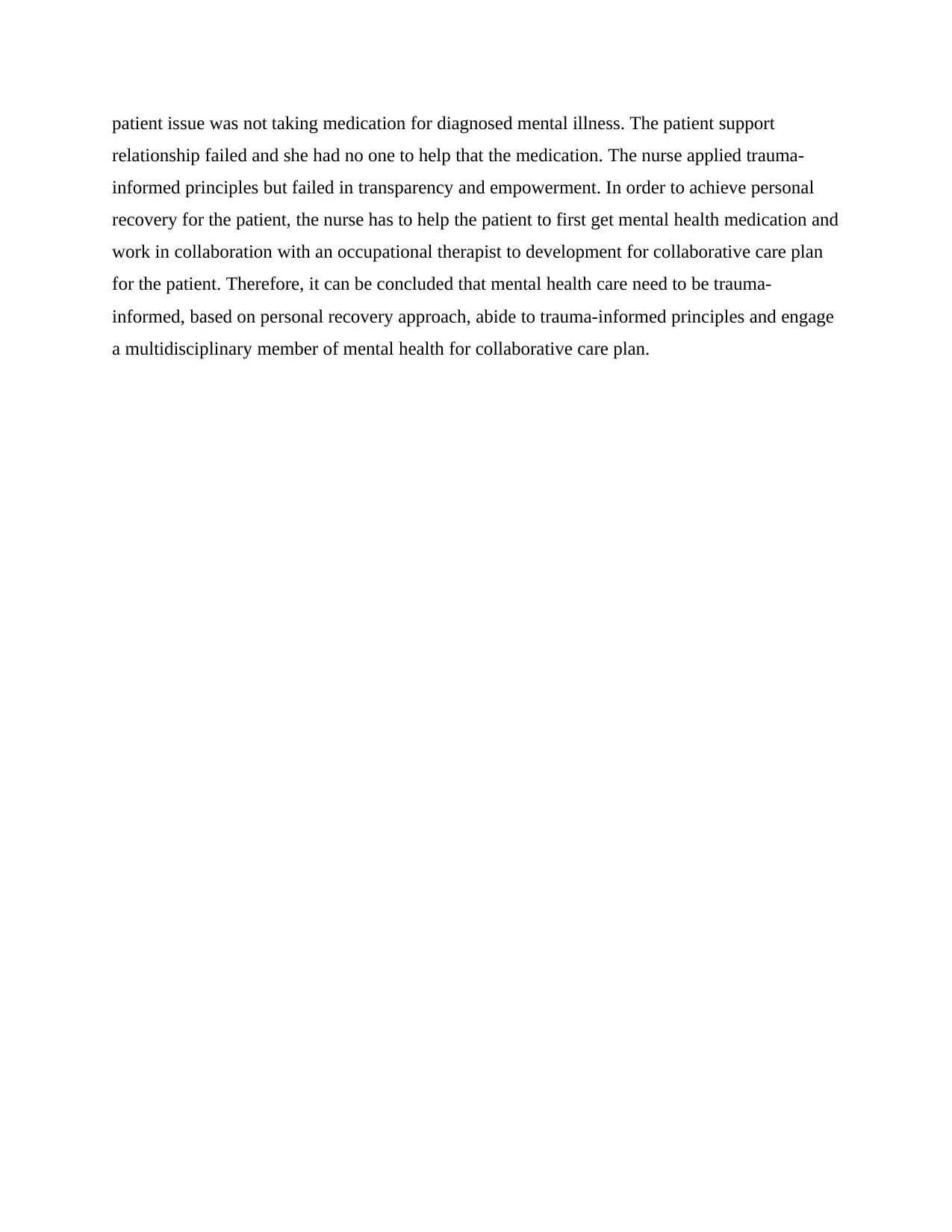
patient issue was not taking medication for diagnosed mental illness. The patient support
relationship failed and she had no one to help that the medication. The nurse applied trauma-
informed principles but failed in transparency and empowerment. In order to achieve personal
recovery for the patient, the nurse has to help the patient to first get mental health medication and
work in collaboration with an occupational therapist to development for collaborative care plan
for the patient. Therefore, it can be concluded that mental health care need to be trauma-
informed, based on personal recovery approach, abide to trauma-informed principles and engage
a multidisciplinary member of mental health for collaborative care plan.
relationship failed and she had no one to help that the medication. The nurse applied trauma-
informed principles but failed in transparency and empowerment. In order to achieve personal
recovery for the patient, the nurse has to help the patient to first get mental health medication and
work in collaboration with an occupational therapist to development for collaborative care plan
for the patient. Therefore, it can be concluded that mental health care need to be trauma-
informed, based on personal recovery approach, abide to trauma-informed principles and engage
a multidisciplinary member of mental health for collaborative care plan.
Paraphrase This Document
Need a fresh take? Get an instant paraphrase of this document with our AI Paraphraser
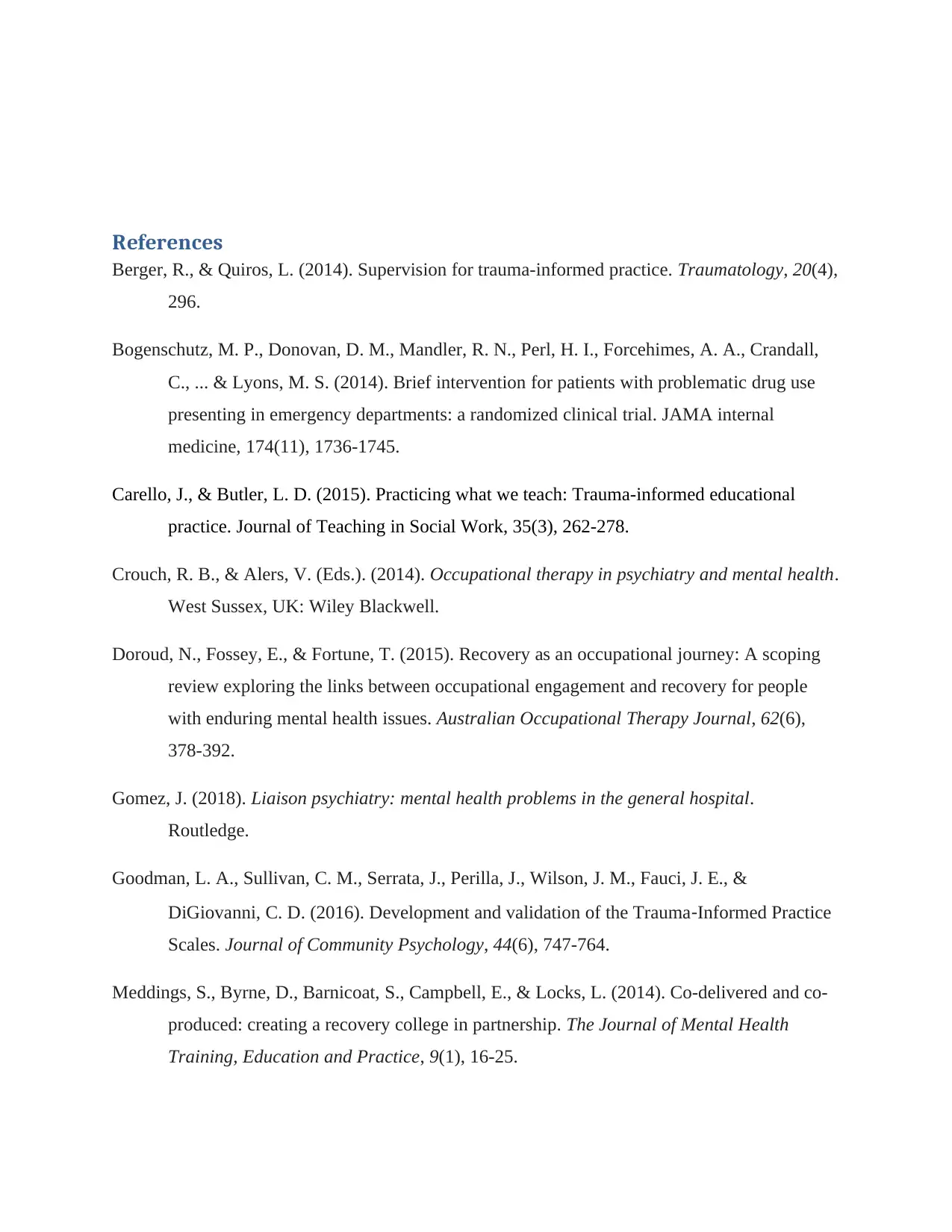
References
Berger, R., & Quiros, L. (2014). Supervision for trauma-informed practice. Traumatology, 20(4),
296.
Bogenschutz, M. P., Donovan, D. M., Mandler, R. N., Perl, H. I., Forcehimes, A. A., Crandall,
C., ... & Lyons, M. S. (2014). Brief intervention for patients with problematic drug use
presenting in emergency departments: a randomized clinical trial. JAMA internal
medicine, 174(11), 1736-1745.
Carello, J., & Butler, L. D. (2015). Practicing what we teach: Trauma-informed educational
practice. Journal of Teaching in Social Work, 35(3), 262-278.
Crouch, R. B., & Alers, V. (Eds.). (2014). Occupational therapy in psychiatry and mental health.
West Sussex, UK: Wiley Blackwell.
Doroud, N., Fossey, E., & Fortune, T. (2015). Recovery as an occupational journey: A scoping
review exploring the links between occupational engagement and recovery for people
with enduring mental health issues. Australian Occupational Therapy Journal, 62(6),
378-392.
Gomez, J. (2018). Liaison psychiatry: mental health problems in the general hospital.
Routledge.
Goodman, L. A., Sullivan, C. M., Serrata, J., Perilla, J., Wilson, J. M., Fauci, J. E., &
DiGiovanni, C. D. (2016). Development and validation of the Trauma‐Informed Practice
Scales. Journal of Community Psychology, 44(6), 747-764.
Meddings, S., Byrne, D., Barnicoat, S., Campbell, E., & Locks, L. (2014). Co-delivered and co-
produced: creating a recovery college in partnership. The Journal of Mental Health
Training, Education and Practice, 9(1), 16-25.
Berger, R., & Quiros, L. (2014). Supervision for trauma-informed practice. Traumatology, 20(4),
296.
Bogenschutz, M. P., Donovan, D. M., Mandler, R. N., Perl, H. I., Forcehimes, A. A., Crandall,
C., ... & Lyons, M. S. (2014). Brief intervention for patients with problematic drug use
presenting in emergency departments: a randomized clinical trial. JAMA internal
medicine, 174(11), 1736-1745.
Carello, J., & Butler, L. D. (2015). Practicing what we teach: Trauma-informed educational
practice. Journal of Teaching in Social Work, 35(3), 262-278.
Crouch, R. B., & Alers, V. (Eds.). (2014). Occupational therapy in psychiatry and mental health.
West Sussex, UK: Wiley Blackwell.
Doroud, N., Fossey, E., & Fortune, T. (2015). Recovery as an occupational journey: A scoping
review exploring the links between occupational engagement and recovery for people
with enduring mental health issues. Australian Occupational Therapy Journal, 62(6),
378-392.
Gomez, J. (2018). Liaison psychiatry: mental health problems in the general hospital.
Routledge.
Goodman, L. A., Sullivan, C. M., Serrata, J., Perilla, J., Wilson, J. M., Fauci, J. E., &
DiGiovanni, C. D. (2016). Development and validation of the Trauma‐Informed Practice
Scales. Journal of Community Psychology, 44(6), 747-764.
Meddings, S., Byrne, D., Barnicoat, S., Campbell, E., & Locks, L. (2014). Co-delivered and co-
produced: creating a recovery college in partnership. The Journal of Mental Health
Training, Education and Practice, 9(1), 16-25.
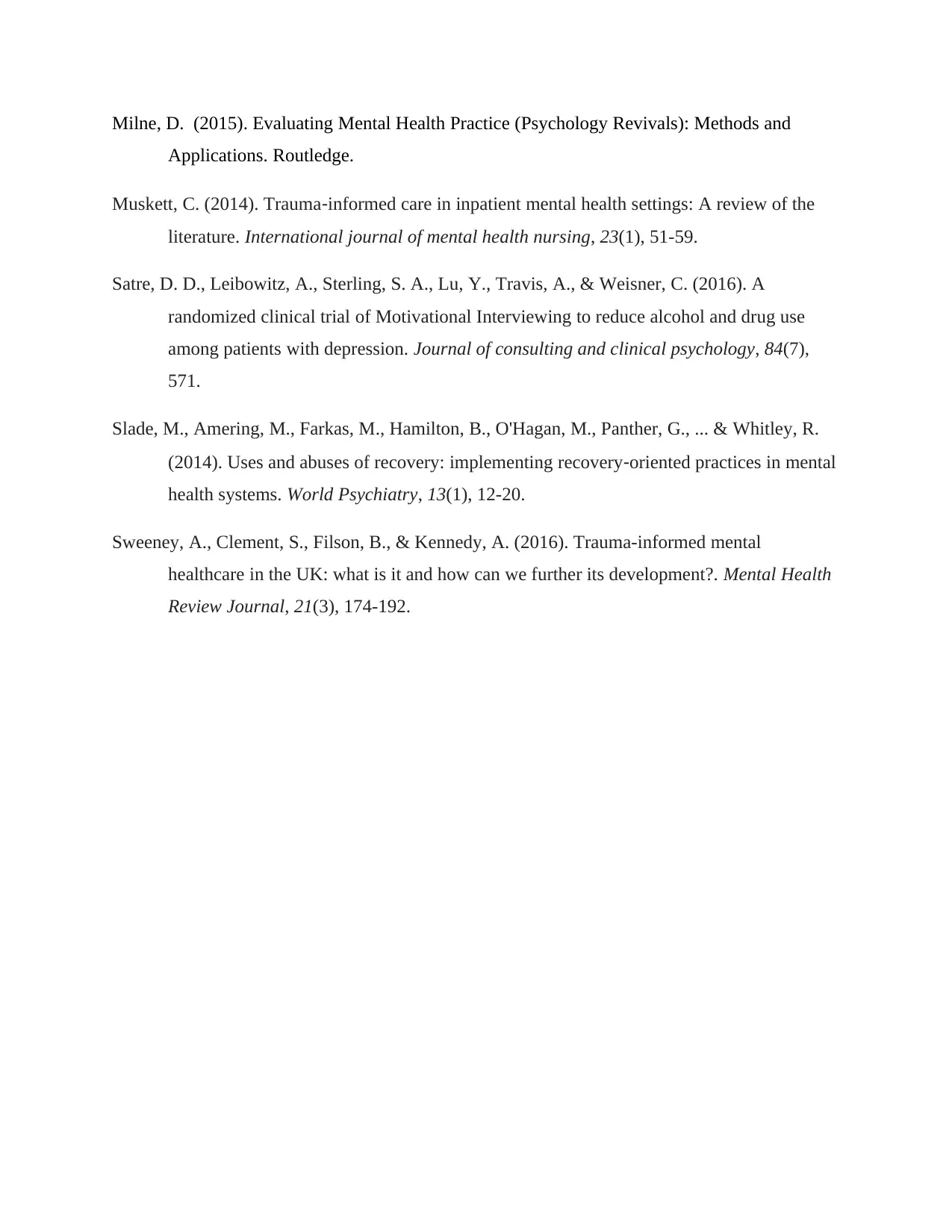
Milne, D. (2015). Evaluating Mental Health Practice (Psychology Revivals): Methods and
Applications. Routledge.
Muskett, C. (2014). Trauma‐informed care in inpatient mental health settings: A review of the
literature. International journal of mental health nursing, 23(1), 51-59.
Satre, D. D., Leibowitz, A., Sterling, S. A., Lu, Y., Travis, A., & Weisner, C. (2016). A
randomized clinical trial of Motivational Interviewing to reduce alcohol and drug use
among patients with depression. Journal of consulting and clinical psychology, 84(7),
571.
Slade, M., Amering, M., Farkas, M., Hamilton, B., O'Hagan, M., Panther, G., ... & Whitley, R.
(2014). Uses and abuses of recovery: implementing recovery‐oriented practices in mental
health systems. World Psychiatry, 13(1), 12-20.
Sweeney, A., Clement, S., Filson, B., & Kennedy, A. (2016). Trauma-informed mental
healthcare in the UK: what is it and how can we further its development?. Mental Health
Review Journal, 21(3), 174-192.
Applications. Routledge.
Muskett, C. (2014). Trauma‐informed care in inpatient mental health settings: A review of the
literature. International journal of mental health nursing, 23(1), 51-59.
Satre, D. D., Leibowitz, A., Sterling, S. A., Lu, Y., Travis, A., & Weisner, C. (2016). A
randomized clinical trial of Motivational Interviewing to reduce alcohol and drug use
among patients with depression. Journal of consulting and clinical psychology, 84(7),
571.
Slade, M., Amering, M., Farkas, M., Hamilton, B., O'Hagan, M., Panther, G., ... & Whitley, R.
(2014). Uses and abuses of recovery: implementing recovery‐oriented practices in mental
health systems. World Psychiatry, 13(1), 12-20.
Sweeney, A., Clement, S., Filson, B., & Kennedy, A. (2016). Trauma-informed mental
healthcare in the UK: what is it and how can we further its development?. Mental Health
Review Journal, 21(3), 174-192.
1 out of 9
Related Documents
Your All-in-One AI-Powered Toolkit for Academic Success.
+13062052269
info@desklib.com
Available 24*7 on WhatsApp / Email
![[object Object]](/_next/static/media/star-bottom.7253800d.svg)
Unlock your academic potential
© 2024 | Zucol Services PVT LTD | All rights reserved.





